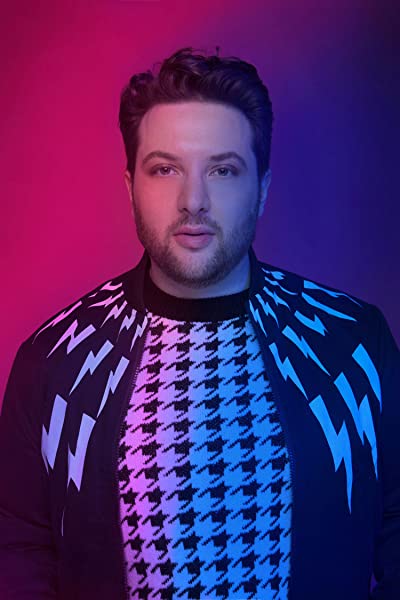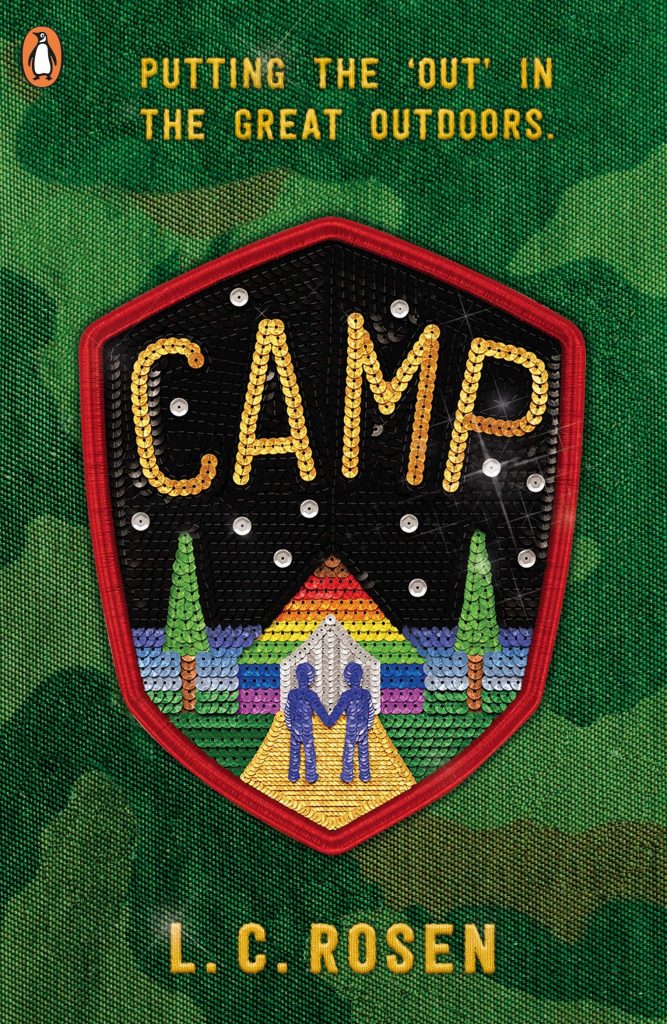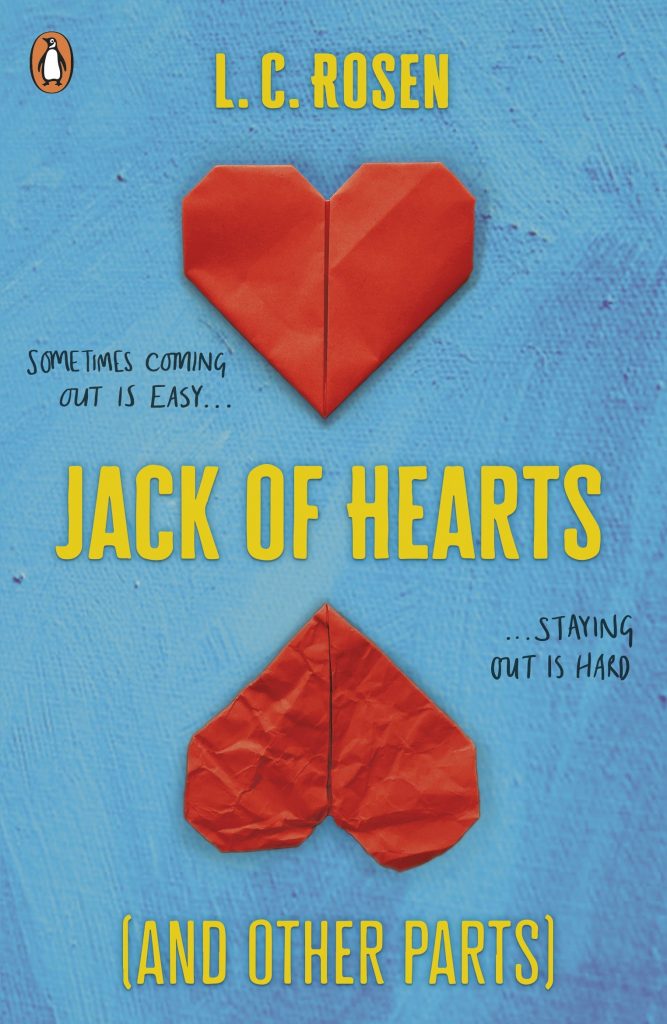Today we talk to author Lev Rosen about writing YA fiction featuring queer teens and his books CAMP and JACK OF HEARTS…

Without giving too much away can you tell us about your book Camp?
Camp is about 16 year old Randy Kappelhoff, who for the past 4 years has been attending Camp Outland, a summer camp for LGBTQIA+ teens, and for the past four years has also been wildly in love with Hudson Aaronson-Lim. Randy loves Camp Outland: he loves being in the musical, he loves showing off his nailpolish, he loves his unicorn sheets – but Hudson, is Masc4Masc, which means he considers himself “straight acting” and is only interested in other “straight acting” guys – something Randy is not. So this summer, he has a plan – he’s come back as Del; butch and looking for love. He’s going to make Hudson fall for him, and then gradually reveal who he really is. This is, of course, a terrible idea. Something his friends point out – but is also works almost immediately – for the first summer ever, Hudson seems to notice him, and is clearly interested. Can Randy really pull off the Del character if it means giving up the things he loves and changing who he is?
I wondered if the LGBT only summer camp in the story was based on one you know? What sort of research did you have to do for the book?
So I went to a conservative Jewish summer camp – where I got most of the homophobic bullying of my youth – and physically, Camp Outland is very much inspired by that camp, yes. But obviously, it was not a queer camp. In fact, when I first came up with the idea, I wasn’t even sure such camps existed, so I googled – and they do! Lots of them! Which makes me so happy for queer kids today. But after that, I just went what was in my head. I knew what I wanted the camp to be and I didn’t want to mess with that by getting caught up in these real camps and how they worked (though they probably work much better).
How is this story similar to your other book Jack of Hearts? How is it different?
Well, I think the big difference is the type of story it is. Camp is a romantic comedy, through and through. Jack of Hearts is an anti-romance, a sex-ed thriller. So the genres are different. But they do deal with similar themes – I love to explore homophobia that isn’t the homophobia people talk about. I think when you hear homophobia you picture people calling gay people fags and beating them up. And that’s definitely one type of homophobia. But I think that that being the image of homophobia lets other people who are homophobic in different ways off the hook – and more importantly, lets those homophobes think of themselves as not being homophobic. But homophobia comes in different forms, and I, growing up in a liberal environment, encountered a lot of this kind: the kind where they love that you’re gay, love gay marriage, but then also think you have to be a certain type of gay. Maybe it’s an accessory, a sassy sidekick, or maybe (and you get this one as a teen a lot) it’s an adorable chaste, mostly gender conforming good boy. The moment you step outside this glass closet though – the moment you start being whomever you want – you suddenly become a “bad gay.” You’re too femme, too butch, too slutty, too mean. You’re a “bad example.” In Jack I explore the way straight society and straight people police queerness and decide what’s right and wrong and how awful that is. In Camp, I explore what happens when those views are internalized, how they’re internalized, and what it is when the queer community is policing itself on behalf of the patriarchy they’re outside of.

I was very impressed with some of the quieter, gentler moments in the book – Hudson talking about his Grandma for example. How do you decide where and when to place these moments amongst all the jokes and fun?
The softer stuff had to be earned. Banter between friends is natural, but opening up, being more vulnerable, that has to be because the characters are willing to open up that way to each other. So it’s not so much about placement as it is about the way their relationship evolved. What did they do that made them close enough that one of them is willing to talk about this. Sometimes it’s as easy as asking, but sometimes it really is a process.
One of the main messages for me was that there is no one way to be queer – all identities are valid. Why did you decide to tackle this theme of masculine and femme gay men?
Gender is a scam. The idea that women are x, men are y is such nonsense. We may be socialized differently, but even that socialization differs between areas, families, religions. And heterosexuality is part of the patriarchy that created these gendered ideas and enforces them. So when we realize we’re not straight, we also have this chance to realize we’re not part of the patriarchy, and step outside it. So why, then, once we’re outside it, do so many queer men keep all it’s trappings. I’m not saying you can’t be into muscle guys or guys in baseball hats or whatever, but you should take a long look at why you’re NOT into guys in nailpolish and if you value the baseball hat over the nail polish for some reason. Masc and femme co-exist in all of us, and we need to embrace that. And I don’t even love using the terms masc and femme because it creates this dichotomy, this polarization – nail polish is the opposite of baseball hats. Which is nonsense! But we don’t even have the language to deconstruct these ideas because they’re so ingrained. But yes, as queer people, I feel like this stuff shouldn’t apply to us. We’re better than that. And I wanted to make that clear in a book – you get to be any kind of queer you want. You get to love sports and makeup. You get to love the obstacle course and the musical.
I loved all the references to musical theatre! Is this a passion of yours?
I grew up in NYC with very musical theater loving parents, so yes, it’s a passion, but also an inheritance.
You tackle sex in a very frank, funny and sensitive manner. Was this a difficult balance to achieve?
Oh gods yeah, my editors had FEELINGS about that scene. Not all teens have sex, which is fine. But the idea that all teens aren’t aware of sex is one of the funniest jokes you could tell me. You think we live in a world where ads for 50 Shades of Grey movies can be on busses and your teenager doesn’t know about sex? Doesn’t have an inkling about kink? Come on. And that’s great! It’s good for them to know! That way they can effectively think about and decide what they want – maybe no sex, maybe lots of it. But the thing is, for teens – especially queer teens – there isn’t much modeling of what sex looks like in a healthy safe way. And that means a lot of kids turn to porn. And if you go into your first time having sex thinking it works like porn… that’s going to be a not-great experience. I did all kinds of sex-ed stuff in Jack of Hearts, but because the book was about someone taking control of his sexual narrative, all the sex scenes were fade to black. I didn’t want to do that here. I wanted to show a fun and funny and sexy first time: lube, condoms, things too slippery, things not being quite what you thought they would – I wanted to show communication, too, Hudson telling Randy what he wants, what he doesn’t want. It’s the first time they’re together and really see each other, and so I knew I needed it to be about them being in synch finally, about them communicating. But yeah, my editors thought it was downright pornographic, so it got scaled back a bit – a bit less moaning, the actual mentions of penises cut back.

I wanted to talk about Mark for a moment and his role in the story. I really felt his support, guidance and acceptance was a pivotal part of the narrative. How important do you think it is for LGBT+ teens to have a supportive mentor? Did you have one?
I love Mark so much. I think queers taking care of baby queers is very important. The thing about being queer is most of the time, you’re born into a family that isn’t queer. You don’t have anyone to teach you your history, set examples for you about queerness, show you what it is to be a strong queer person. You need to find them out there in the world, and often baby gays do not. And because of that, they don’t get to see who they could grow up to be – they don’t know their futures and so they can sometimes stay trapped in the stage where they’re figuring out who they are. We all stay in that stage for a while, I think, straight or gay, but when you’re straight, you’re looking at the hundreds and thousands of straight people around you and taking bits of them and saying oh I’m like this or I’m like him or her or whatever and trying on roles and parts of yourself – normal teen/20s stuff. When you’re queer, the amount of queer people around you are considerably less. Sometimes you don’t know any queer adults in real life, and all you have is the ones in books and TV – many of whom aren’t even created by queer people, and so don’t have any actual idea of what it is to be queer in the world. So you try on fewer roles, fewer pieces of personality, many of which are just “the gay one.” And you never get to evolve and find yourself the way straight people do, until you find yourself in a queer community, in a queer space. Then you have these adults and the people around you and you have an idea of who you could be in the future. You can see a future. And that’s why queer mentors are important. They can show you a future while letting you find your own.
Are there any plans for a sequel? Do you have any thoughts about what Randy and Hudson are up to now?
I mean, I’d be up for it, but it depends a lot on sales. I think next summer, Randy and Hudson would still be together, for sure. But between summers, it’s tough. They’re far apart, Hudson’s parents are still his parents and so Hudson is sort of hiding his light under a rock, and Randy is his only outlet. And Randy loves him but it’s hard being that one bit of freedom for someone, especially when you’re far away and you’re missing calls and ever conversation feels life and death. It’s going to be a hard year for them. But they’ll get through it. And next summer will be special. Really just four weeks in love. I’d love to write a sequel where it’s like Camp Outland v. the neighboring religious camp that’s trying to buy the land and put Camp Outland out of business. Camp hijynx, more about adventure and fun than falling in love – because they’re already a couple. But maybe some of the others could find love. I always felt bad I couldn’t put in a romance for Jordan. They deserve one. There just wasn’t room. So maybe they and one of the religious campers have a romeo and juliet situation. It would be fun. Gotta buy those books if you want that to happen, though (yeah, I’m shameless, but it’s also very true – no sequel without sales in the world of capitalism!)
Finally, can you describe Camp in three words?
Pitch a tent!

